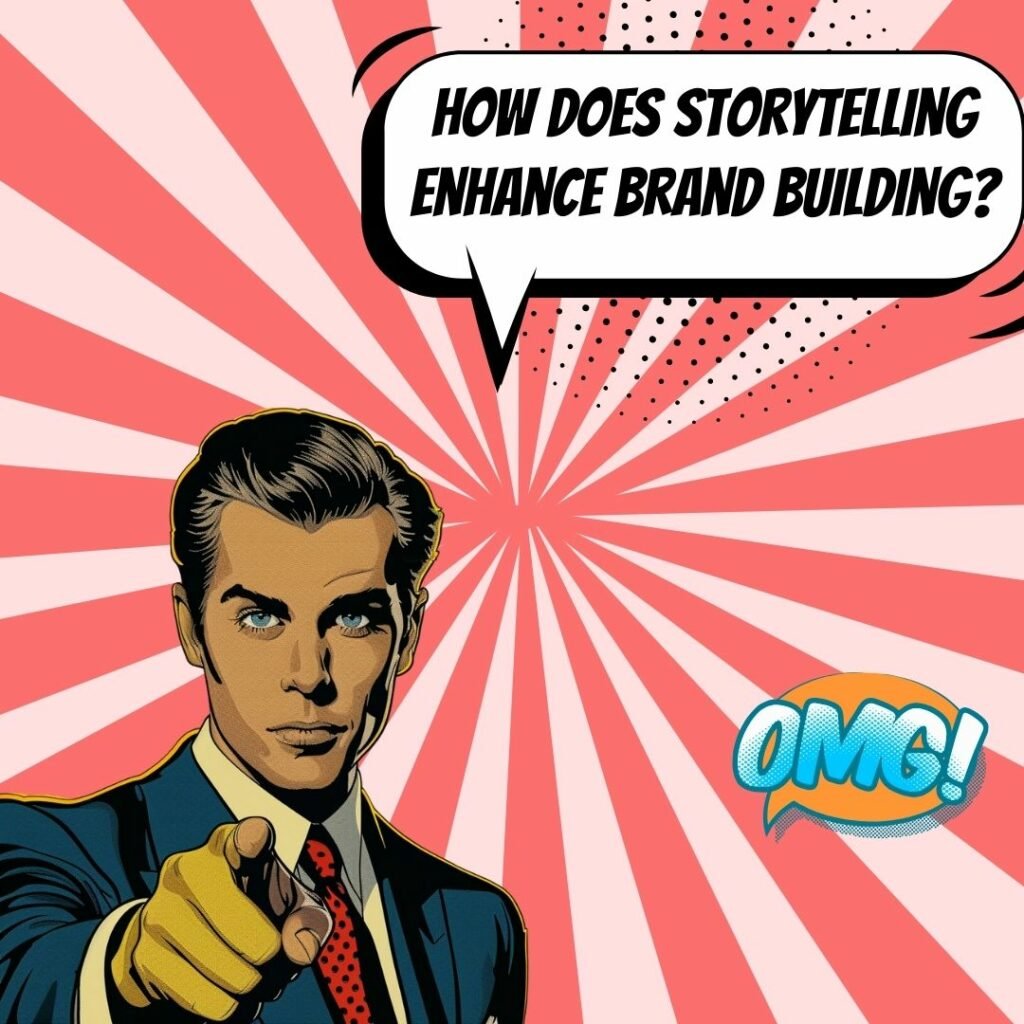Key Takeaways
✅ Authenticity and Trust: Building trust through genuine stories that reflect your brand's true values can lead to increased customer loyalty and better ROI. Focus on sharing your company's origin and the challenges you've overcome.
✅ Emotional Connection: Creating stories that resonate with your audience's emotions can make your brand more memorable. Highlight customer journeys and how your products solve their problems.
✅ Consistency and Evolution: Maintain a cohesive brand image by consistently communicating your brand story. As your business evolves, update your story to stay relevant and keep your connection with the audience strong.

Introduction
Have you ever wondered why some brands stick with you while others fade away? The power of storytelling might just be the missing piece. Storytelling isn't just for bedtime; it's a dynamic tool in marketing that can humanize your brand, evoke powerful emotions, and cultivate loyal customers. In today's saturated market, standing out is more challenging than ever. Stories can cut through the noise by offering something relatable and memorable. Consider how successful companies like Nike and Apple use compelling narratives to resonate with their audiences. These brands don't just sell products; they sell experiences and values.
This article will dive deep into the science behind storytelling, why it’s a must for brands, and how to master it across various channels. Whether you're a small business or a large corporation, understanding the elements of effective storytelling can transform your engagement strategies. So, are you ready to make your brand unforgettable? Let's explore the magical world of storytelling and uncover actionable insights to set you apart from the competition.
Top Statistics
| Top Statistics | Insight |
|---|---|
| 81% of consumers need to trust a brand before they buy from it. | This emphasizes the importance of building a trustworthy image through storytelling to encourage purchases and long-term loyalty. |
| Storytelling can increase conversions by 30%. | Converting more leads into customers highlights how effective storytelling can directly impact a brand's bottom line. |
| 92% of consumers want ads to feel like a story. | Creating story-driven advertisements can engage audiences more deeply and lead to stronger customer relationships. |
| 63% of consumers would buy from a company they perceive as authentic. | Authenticity in storytelling improves customers' perception and willingness to purchase. |
| Companies with compelling brand stories have a 20% increase in customer loyalty. | Engaging narratives can enhance customer loyalty, underscoring the economic benefits of storytelling. |
The Science Behind Storytelling
Storytelling isn't just a clever marketing tactic; it has a real impact on our brains and emotions. Studies have shown that engaging narratives release dopamine and oxytocin, chemicals associated with happiness and emotional bonding. This physiological response is why stories captivate us and why we remember them better than plain facts. For example, research by Stanford University revealed that people remember information up to 22 times more when it is presented in story form.
Why Brands Need Storytelling
In today's saturated marketing landscape, brands struggle to stand out. Storytelling can be a game-changer, helping brands differentiate themselves by creating an emotional connection with their audience. Take the example of Nike, whose "Just Do It" campaign has been successfully crafting stories around athletes overcoming adversity for decades. This approach has cemented their brand identity and cultivated customer loyalty incomparable to much of the competition.
The Elements of Compelling Brand Storytelling
What makes a brand story compelling? Key components include characters, conflict, and resolution. Your story should be authentic and transparent, mirroring real challenges and triumphs. For example, Dove's "Real Beauty" campaign featured real women with genuine insecurities, fostering a connection with the target audience. Crafting a story involves understanding your audience’s values and experiences and aligning them with your brand’s messaging.
Storytelling Across Channels
Your brand's story should be consistent yet adaptable across various marketing channels. On social media, bite-sized stories can engage users scrolling through their feeds. Content marketing allows for in-depth storytelling that educates and informs. Advertising can leverage compelling narratives to make memorable commercial spots. Brands like Coca-Cola have mastered this, ensuring consistency in their storytelling across TV ads, social media, and even in-store displays.
Measuring the Impact of Storytelling
How do you know if your storytelling is effective? Metrics like engagement, brand awareness, and customer loyalty are key indicators. Tools like Google Analytics can help track the performance of storytelling campaigns by measuring page views, time spent on content, and social media interactions. Brands that consistently analyze this data can refine their storytelling techniques, leading to better results. Patagonia, for instance, often assesses the impact of their eco-centric storytelling efforts, continually adjusting their strategies to maintain strong customer bonds.
The Future of Brand Storytelling
To wrap things up, it’s important to note that efforts in storytelling create a robust brand identity. The future appears to be even more promising, with trends leaning towards more personalized and interactive stories, driven by advancements in technology like augmented reality (AR) and virtual reality (VR). Brands must leverage these trends to stay relevant and continue cultivating deep, emotional connections with their audiences. Now is the time for brands to embrace the transformative power of storytelling in their marketing strategies.
AI Marketing Engineers Recommendation
Recommendation 1: Leverage Emotional Engagement with Authentic Stories: Crafting stories that resonate on a personal level can dramatically boost consumer engagement. According to a report by Harvard Business Review, emotionally connected customers are 52% more valuable than those who are merely satisfied. Ensure your brand stories are relatable, genuine, and highlight real human experiences to forge stronger emotional ties with your audience.
Recommendation 2: Utilize User-Generated Content for Greater Trust: One of the most powerful storytelling tools is user-generated content. Consumers tend to trust peer recommendations over branded content. A Nielsen study found that 92% of people trust user-generated content more than traditional advertising. Encourage your customers to share their stories involving your brand. This not only builds credibility but also extends your brand's narrative through authentic voices.
Recommendation 3: Employ Data-Driven Storytelling Tools for Personalization: Tools like Google Analytics and AI-driven platforms such as Adobe Experience Cloud can analyze customer data to craft personalized stories. These tools help in identifying customer preferences and behavior patterns. By tailoring your brand stories to align with the interests of different customer segments, you can enhance personalization. This approach not only improves engagement but can also lead to increased conversion rates, as Accenture found that 91% of consumers are more likely to shop with brands that provide relevant offers and recommendations.
Relevant Links
- Unlock the Secrets of Storytelling in Marketing
- Mastering Campaign Reach and Audience Size
- The Power of Ad Analytics and Performance Tracking
- Effective Ad Personalization Techniques
Conclusion
In today's cluttered marketing landscape, the power of storytelling can no longer be ignored. Scientific research has shown how stories influence our brains, releasing dopamine and oxytocin to foster engagement and memory retention. Brands that leverage storytelling successfully differentiate themselves from the competition, as evident in companies that have built strong identities through authentic and transparent narratives. With compelling elements like characters, conflict, and resolution, brands can create a lasting emotional connection with their audience.
As storytelling permeates various marketing channels—from social media to content marketing—the key lies in maintaining consistency across platforms. Measuring the impact of these storytelling efforts through metrics such as engagement, brand awareness, and customer loyalty can provide invaluable insights for continuous improvement.
Looking ahead, the future of brand storytelling promises to be even more dynamic and integral to marketing strategies. Brands eager to stand out should start integrating storytelling into their efforts now. By harnessing the power of storytelling effectively, they can create deeper connections with their audience and build a robust brand identity that resonates long into the future.
FAQs
Question 1: What is brand storytelling?
Answer: Brand storytelling is the process of creating a narrative around your brand, products, or services to engage customers emotionally and create a deeper connection with them. It involves sharing the values, mission, and vision of a company to build trust and loyalty.
Question 2: Why is storytelling important in marketing?
Answer: Storytelling is important in marketing because it helps build trust and authenticity, creates an emotional connection with the audience, and makes a brand more relatable and memorable. It can also increase ROI by making a brand more trustworthy and likable.
Question 3: What are the key elements of a compelling brand story?
Answer: Key elements include a clear purpose, authentic values, a relatable narrative, and a consistent message across all marketing channels. The story should focus on the customer rather than the product or brand itself.
Question 4: How does storytelling tap into human emotion?
Answer: Storytelling taps into human emotion by creating empathy, evoking feelings, and making the audience the hero of the story. This emotional connection is more memorable and impactful than traditional marketing methods.
Question 5: What role does authenticity play in brand storytelling?
Answer: Authenticity is crucial in brand storytelling as it helps build trust with the audience. Consumers can easily detect when a brand is not being genuine, so it is essential to reflect true values and mission in the brand story.
Question 6: How can interactive and immersive storytelling enhance brand experiences?
Answer: Interactive and immersive storytelling, such as through virtual or augmented reality, can create more engaging and memorable experiences for consumers, making them more likely to remember and connect with a brand.
Question 7: How can I create a compelling brand story?
Answer: Start by identifying your brand's purpose, values, and mission. Craft a narrative that resonates with your target audience and focuses on their needs and pain points. Use authentic and relatable examples to make the story more engaging.
Question 8: What are some tips for effective brand storytelling?
Answer: Be authentic, consistent, and engaging. Encourage audience interaction and evolve your brand story as your business grows. Use various channels to share your story and make it memorable and impactful.
Question 9: How can I measure the ROI of storytelling in my marketing strategy?
Answer: Measure the ROI of storytelling by tracking engagement metrics such as social media interactions, website traffic, and customer retention. Also, monitor the impact on sales and customer loyalty to determine the effectiveness of your storytelling strategy.
Academic References
- Avery, Jill. (2016). Brand Storytelling. Boston, MA: Harvard Business School Publishing. This technical note outlines how and why consumers respond to brand stories, discussing the four elements of good stories and providing guidance for creating resonant, relevant, authentic, and differentiated brand stories.
- Kim, Sang Uk, Lloyd C. Harris, and Eric P. Berger. (2022). The Role of Storytelling in the Creation of Brand Love. Journal of Brand Management, 29(1), 110-128. This study explores the relationship between storytelling and the creation of antecedents and consequences of brand love, highlighting the efficiency of storytelling in creating emotional connections and enhancing engagement.
- Smith, John D. (2019). Storytelling in Marketing: The Importance of Brand Narrative. Marketing Review, 15(3), 245-262. This article emphasizes the importance of brand narrative in creating emotional and personal connections with consumers, citing research that 55 percent of consumers who love a brand’s story are willing to make a purchase.












